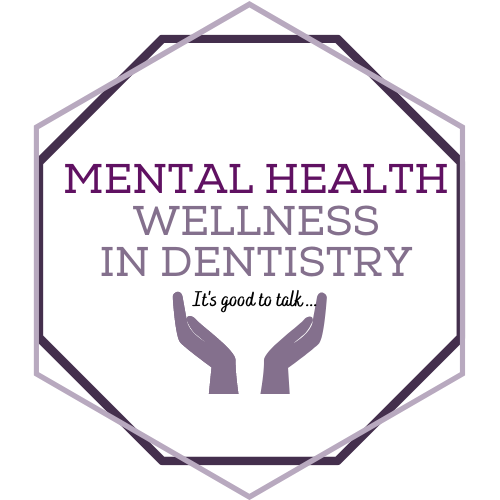Mental Health Wellness in Dentistry – New Initiative Launches
NewsPosted by: Dental Design 12th May 2021

This week (10-16 May), sees Mental Health Awareness Week and to coincide with this important event, a new dental initiative has been launched to encourage all dental workplaces to make Mental Health Wellness a priority.
The Mental Health Wellness strategic steering group was formed through the Dental Professional Alliance, specifically to co-design, develop and maintain a framework that encourages and enables all dental professionals to act in a timely, appropriate, and safe manner when identifying Mental Health Wellness issues in the workplace. The strategic steering group has been led and Chaired by Fiona Ellwood BEM DPA, a trained and practising Mental Health First Aider, and Roz McMullan, Chair of Probing Stress in Dentistry in Northern Ireland.
The initiative has gained widespread support from across dentistry, with a large number of endorsing partners including the Royal Colleges of Surgeons and the Royal College of Physicians and Surgeons, General Dental Council, Chief Dental Officer of Scotland, Chief Dental Officer of Wales, Acting Chief Dental Officer of Northern Ireland, FGDP (UK), College of General Dentistry, British Dental Association, British Orthodontic Society, Association of Dental Groups, British Association of Dental Therapists, British Society of Dental Hygiene & Therapy, Society of British Dental Nurses, Orthodontic Therapists Society, Orthodontic Technicians Association, British Institute of Surgical & Dental Technologists, British Association of Clinical Dental Technology, British Society of Paediatric Dentistry, Public Health England, Denplan, Dental Laboratories Association and Mental Health First Aid (MHFA) England.
So, why now? Mental health is never far from front page news and it has a longstanding association with dentistry. When in fact when you look closer this appears to be associated with dentists rather than the whole team. To anyone that understands the intricacies of being part of a dental team and especially the clinical team, it is difficult to perhaps see why there have only ever been papers and research on dentists. Yes, there are added pressures, but if pressures spill over it can very quickly become a team matter. Support for the whole team is varied across settings (primary and secondary care), and across team members and yet mental health knows no such boundaries, and this was the driver and start of the work from the Dental Professional Alliance.
There have been several papers produced during the pandemic about stress, anxiety, and burnout, most have again focused on the dentist. When you look to the NHS in general, it talks more broadly of frontline staff, although much has been written about the nursing teams too. Whilst we know that stress, anxiety, and burnout are not mental illnesses we know that they can add to mental health issues. In an almost timely fashion, the Office for National Statistics1 has only last week published the data on Coronavirus and Depression in Adults and this paints a worrying picture. Double the number of adults have experienced depression symptoms in comparison to the pre-COVID statistics. In Jan – March 2021 1-5 (21%) have suffered with depression symptoms, with an increase from Nov 2020, which was 19%. Notably, the evidence shows that 4-10 cases are young adults and female.
In complete coincidence, Humphris et al2 published a paper looking at health and wellbeing as an outcome of uncertainties of the pandemic in dental team members. “Of 329 respondents the researchers report that 27% appear to have reported significant depressive symptomology and 55% appear to suggest that they have suffered emotional exhaustion”. Interestingly the paper suggests that primary care staff reported higher incidences. What is of great interest is the recommendations, which clearly suggest that there could be benefit of “resourcing staffsupport and interventions to help team members in [challenging times].”
Not only does the Humphris et al2 paper speak to the whole team it touches on the narrative of resourcing staff support and interventions, which takes this full circle and right back to the principles of the extensive work recently undertaken by the Dental Professional Alliance and stakeholders, who have designed a framework introducing the need for a mental health wellness lead in every dental setting with an underlying ethos that early intervention and safe signposting is paramount.
The initial call to action from the initiative is that each dental workplace should have an identified individual who acts as a ‘Mental Health Wellness Lead’ and who through a recognised training programme is confident, competent and committed to improving the perception of mental health wellness in the workplace. This forms part of a 6 part process:
- All members of dental team to undergo Stress Awareness Training
- Identify Mental Health Wellness Lead
- Leads to undertake MHFA training
- Design workplace action plan
- Join local peer support networks
- Complete annual training and maintain skills
Roz McMullan said, “No one should feel alone or unable to talk to someone at work and for this very reason, this ‘Call to Action’ asks decision makers and line managers to adopt this cultural change to Mental Health Wellness in the dental workplace and commit to the recognised training pathway.”
Fiona Ellwood added, “We want this mental health wellness to deliver real change in the dental workplace through a plan of practical advice and action. We will work with partners to provide leadership, support, and direction on joint work. We will work with employers, local teams and professional partners in UK to oversee implementation of the framework. Fundamentally, we want to see a Mental Health Wellness Lead in every practice and place of dental employment across the UK.”
The General Dental Council (GDC) has also welcomed the launch of the initiative. In support, Rebecca Cooper, Head of GDC Policy and Research Programme, said: “Conversations about mental health should be encouraged. Dental professionals should feel able to share their experiences and think about the steps that can be taken to improve and safeguard mental health wellness. Produced from within the sector, this new framework provides clear and simple everyday guidance which promotes mental health wellness for all members of the dental team. Dental professionals’ mental health plays a vital role in the provision of safe, effective, person-centred care and this framework is an important step forward.”
For more information about the initiative and how you can get involved, please visit: https://mhwd.org/










